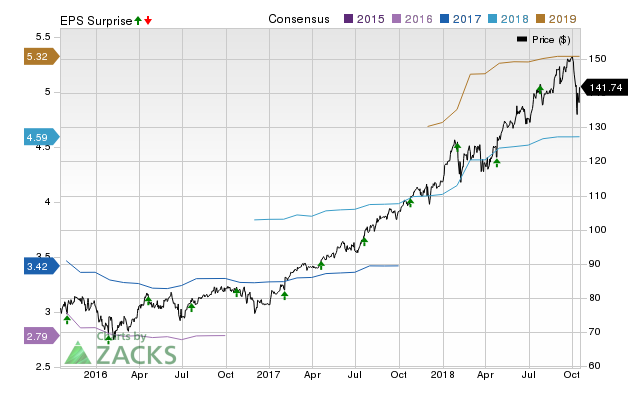Wall Street expects a year-over-year increase in earnings on higher revenues when Visa (VÂ -Â Free Report) reports results for the quarter ended September 2018. While this widely-known consensus outlook is important in gauging the company’s earnings picture, a powerful factor that could impact its near-term stock price is how the actual results compare to these estimates.
The earnings report, which is expected to be released on October 24, 2018, might help the stock move higher if these key numbers are better than expectations. On the other hand, if they miss, the stock may move lower.
While the sustainability of the immediate price change and future earnings expectations will mostly depend on management’s discussion of business conditions on the earnings call, it’s worth handicapping the probability of a positive EPS surprise.
Zacks Consensus Estimate
This global payments processor is expected to post quarterly earnings of $1.20 per share in its upcoming report, which represents a year-over-year change of +33.3%.
Revenues are expected to be $5.42 billion, up 11.6% from the year-ago quarter.
Estimate Revisions Trend
The consensus EPS estimate for the quarter has remained unchanged over the last 30 days. This is essentially a reflection of how the covering analysts have collectively reassessed their initial estimates over this period.
Investors should keep in mind that the direction of estimate revisions by each of the covering analysts may not always get reflected in the aggregate change.
Price, Consensus and EPS Surprise

Earnings Whisper
Estimate revisions ahead of a company’s earnings release offer clues to the business conditions for the period whose results are coming out. This insight is at the core of our proprietary surprise prediction model — the Zacks Earnings ESP (Expected Surprise Prediction).
The Zacks Earnings ESP compares the Most Accurate Estimate to the Zacks Consensus Estimate for the quarter; the Most Accurate Estimate is a version of the Zacks Consensus whose definition is subject to change. The idea here is that analysts revising their estimates right before an earnings release have the latest information, which could potentially be more accurate than what they and others contributing to the consensus had predicted earlier.

